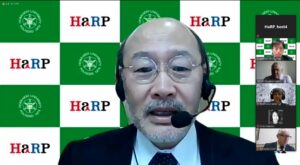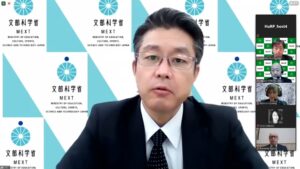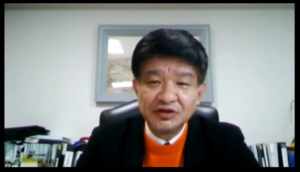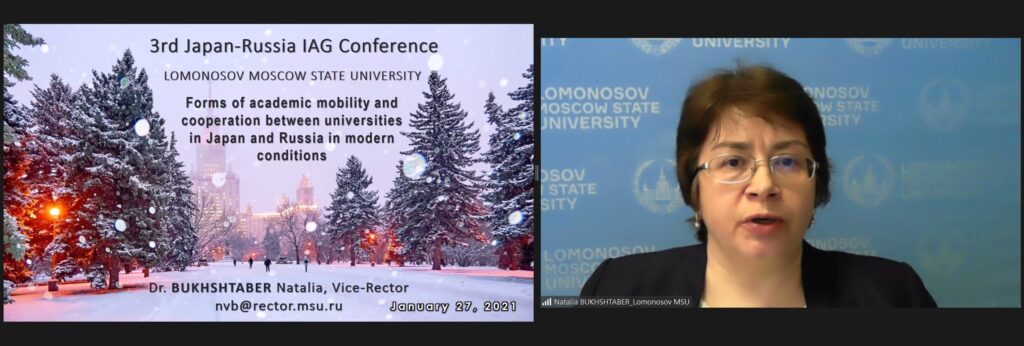On the afternoon of Wednesday, January 27, 2021, the 3rd Japan Russia Industry, Academia and Government Working-Level Conference (IAG Conference) and the Debriefing session for the universities participating in the MEXT Inter-University Exchange Project (Russia) were held online. This conference is one of the activities for the 2017 MEXT project (HaRP Project), the Inter-University Exchange Project: Platform-Building Program (Type B, Russia) that Hokkaido University and Niigata University jointly applied and adopted. At the second conference held last year, approximately 160 people from 29 institutions and organizations, in addition to universities engaged in Japanese-Russian collaboration (19 Japanese universities and 30 Russian universities), gathered together to share information and exchange opinions with the aim of developing and promoting exchange between Japan and Russia. This year’s conference, the third of its kind, was held online due to the spread of the COVID-19 epidemic. However, the attendance exceeded that of last year’s conference, with 185 participants from 31 Japanese and 57 Russian institutions, including universities engaged in Japan-Russia exchange (23 from Japan and 47 from Russia), the Ministry of Education, Culture, Sports, Science and Technology (MEXT), Ministry of Economy, Trade and Industry (METI), and related companies and organizations. This conference was approved and carried out as an official event of the Association of Institutions of Higher Education of the Russian Federation and Japan and as an event for the year of Japan-Russia Regional and Sister City Exchange.

Before the 3rd Japan Russia Industry, Academia and Government Working-Level Conference, the Debriefing session for the universities participating in the MEXT Inter-University Exchange Project (Russia) was held from 1:00 p.m. Seven projects of eight universities (Chiba University, Tokyo University of Foreign Studies, Tokyo Institute of Technology, Kanazawa University, Nagasaki University/Fukushima Medical University, Tokai University, and Kindai University) that were selected in 2017 reported on their educational exchange efforts with Russia and the challenges that they face during the COVID-19 crisis. Each university introduced their online educational programs for exchange with Russia, which were designed to provide the same educational value as face-to-face exchanges. There was also an exchange of opinions between the Ministry of Education, Culture, Sports, Science and Technology (MEXT) members and the selected universities, which allowed for the sharing of useful information among those involved in the Inter-University Exchange Project.


The 3rd Japan Russia Industry, Academia and Government Working-Level Conference, which started at 3:00 p.m., consisted of two sessions, beginning with opening remarks by Prof. Atsushi Yokota, Executive Vice President of Hokkaido University, and Mr. Kuniaki Sato, Chief Director for University Reform and Director of the Office for International Planning at the Higher Education Bureau of the Ministry of Education, Culture, Sports, Science and Technology (MEXT).
In the first session, which covered the theme of “University-industry-government partnership for career support ” presenters from Hokkaido University provided a specialized section activity report for FY 2020 and explained the topics of the first session (industry, academia, and government consortium’s efforts and interconnection with coordinator education at universities), and afterwards, presentations were given about career support efforts from the perspectives of industry, academia, and government respectively. First, Mr. Shimoyashiro from the Japan External Trade Organization (JETRO) gave a presentation on the current state and future challenges of Japanese-Russian exchange of highly-skilled professionals based on the results of surveys regarding highly-skilled Russian professionals. Afterward, from the Russian side, Prof. Strizhak from the Higher School of Economics explained the joint internship program with UNIQLO Russia, and Mr. Korsunov from Sakhalin State University and Mr. Kuno from the Consul-General of Japan in Yuzhno-Sakhalinsk explained the industry, academia, and government joint seminar for imparting Japanese knowledge in the fields of waste treatment and energy to young researchers in Russia. From the Japanese side, Mr. Matsushita from Kindai University and Prof. Arai from Tokyo University of Foreign Studies explained their efforts to provide career support to the participants of the Japan-Russia Human Resources Development Program, specifically the corporate internship program and the fostering of coordinators through the implementation of business lectures by alumni. In addition, following an explanation of the initiatives for Japan-Russia human resource development and interregional exchange based on the eight-point cooperation plan by Mr. Tsuruda from the Ministry of Economy, Trade and Industry (METI), Mr. Sato representing the government of Hokkaido introduced the prefecture’s initiatives for interregional exchange and the utilization of Russian human resources between Hokkaido and Russia in such areas as medical care, administration, and Russian language education. In the exchange of opinions that followed, each presenter discussed in depth the ingenuity in implementing internship programs and the role of university education in fostering coordinators. Finally, Dr. Tsuyoshi Setoguchi, Dean of the Faculty of Engineering, Hokkaido University, who served as a moderator, summarized the first session by expressing the necessity to continue sharing individual networks and knowledge between companies and universities through the HaRP project, and to promote collaboration that would be beneficial both to companies and universities.

Starting at 5:00 p.m., the second session covered the theme of “Further collaboration in education between Japanese and Russian universities” following a speech given by a guest reading for Mr. Igor Ganshin, Head of International Relations Department of the Ministry of Education and Science of the Russian Federation, a report was given on the activities of the Japan-Russia Student Union and the Committee for Personnel Exchanges, which are organizations established by the Association of Japanese and Russian Universities. In the report, Prof. Kato from the Human Resources Exchange Committee explained the differences in the university education systems between Japan and Russia and the current state of credit transfer and accreditation between the two countries. In particular, he introduced the competence-based curriculum of Russian universities and the framework for educational cooperation with other institutions, known as the network form, to participants from Japanese universities. During the session in which each institution gave presentations, Prof. Bukhshtaber from Lomonosov Moscow State University represented the Russian side and gave a presentation on efforts to improve student mobility in the COVID-19 crisis, especially with regard to the implementation of online classes and joint research, and the system to certify credits earned at Japanese universities. From the Japanese side, participants introduced unique initiatives including credit exchange in Niigata University’s double degree programs in medical fields and Hokkaido University’s joint master’s program with Russian universities using the network form. Furthermore, a participant from Hokkaido University, the university carrying out the HaRP project, shared with the other participants a vision of the project implementation plan after FY 2021, which marks the end of the grant-in-aid period of the HaRP project. During the exchange of opinions, members from both Japanese and Russian institutions introduced examples of educational cooperation, such as credit transfer and cotutelle programs, and through an introduction on the concept of competence from the Japanese side, they expressed their expectations for the development of educational cooperation in a way that ensures the quality of education. At the end, Professor Hirofumi Kato of Hokkaido University, Chair of the Committee for Personnel Exchanges, closed the conference by indicating that they will continue discussions to promote the sharing of educational programs between Japanese and Russian universities based on the concepts of competence and network form.

In the first and second sessions of the conference, participants shared information and exchanged opinions on human resource development from various viewpoints, and the HaRP Project’s Japan-Russia collaboration efforts were made known to many people from a diverse range of perspectives. The conference served as an opportunity to further strengthen the network of coordinators involved in Japan-Russia exchange, and to implement various initiatives to develop human resources through the collaboration of industry, academia and government and educational cooperation between Japan and Russian universities.
Please also see the page here.
